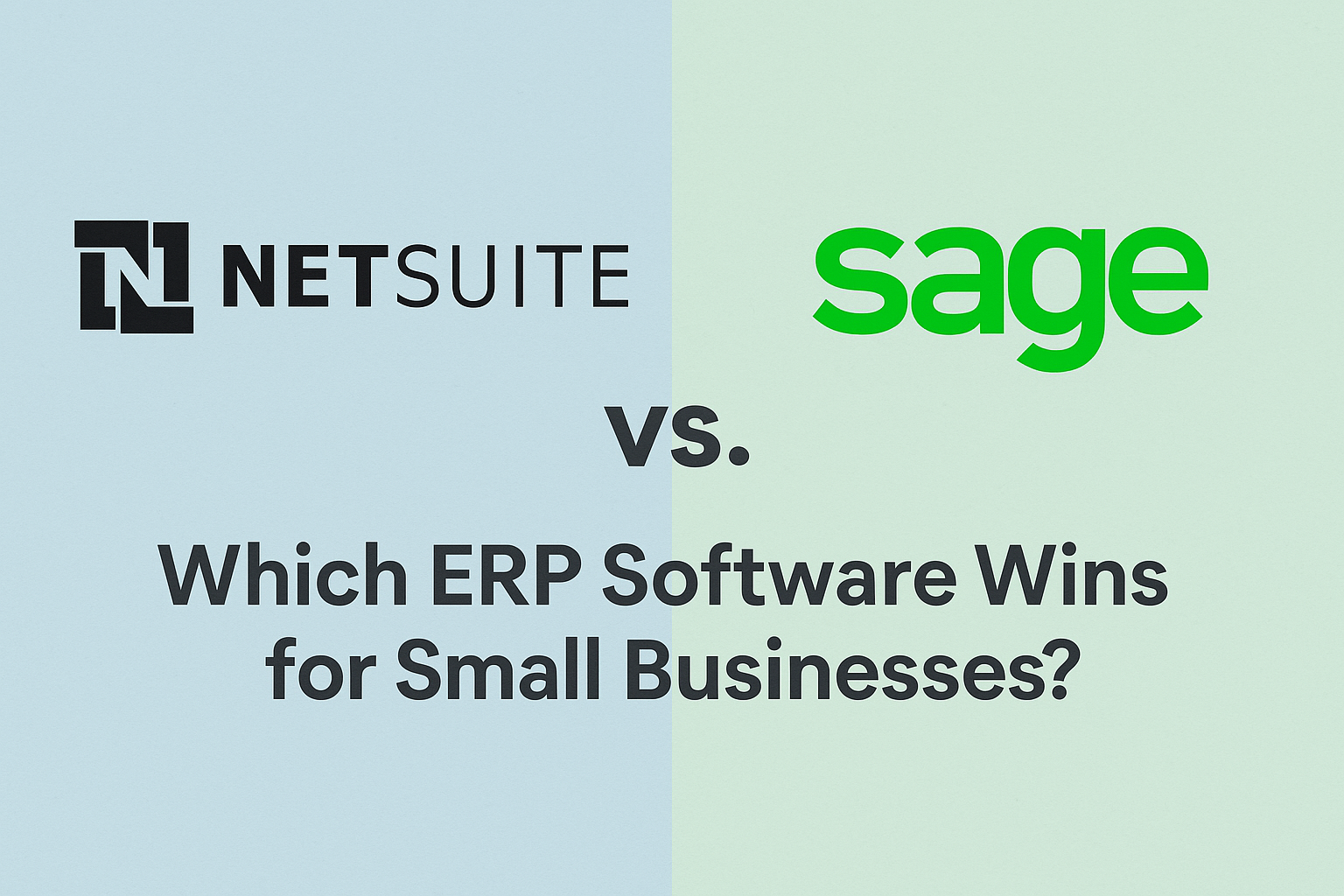Click OPEN Now / Visit Above
NOTE: Businesses today thrive on efficiency, security, and seamless management. Whether it's optimizing workflows with ERP Software, safeguarding assets through Insurance, ensuring compliance with Legal Services, managing financial obligations with Debt Management, or enhancing customer relationships with CRM Software—having the right solutions in place is crucial. Empower your business with cutting-edge tools designed to streamline operations and drive success.
NetSuite vs. Sage: Which ERP Software Wins for Small Businesses?

NetSuite vs. Sage: Which ERP Software Wins for Small Businesses?
A Detailed Comparison of Top ERP Solutions for 2025
Introduction to NetSuite vs. Sage for Small Businesses
Choosing the right ERP software is a pivotal decision for small businesses aiming to streamline operations and fuel growth in 2025. In the NetSuite Sage showdown, two heavyweights—ERP Oracle NetSuite and Sage—vie for the title of best cloud-based ERP software. But which one truly meets the needs of small business ERP users? This blog dives deep into their features, benefits, and drawbacks to help you decide.
With small businesses seeking affordable ERP solutions that scale, both NetSuite and Sage offer compelling options. NetSuite, a cloud-native pioneer, and Sage, with its versatile product suite, cater to different priorities. Whether you’re after robust integrations or budget-friendly flexibility, this NetSuite vs Sage comparison will guide you to the ideal choice. Let’s explore the battle of these ERP titans!
For a broader ERP overview, check out Best Cloud-Based ERP Software: Which One Wins in 2025?.
What Are NetSuite and Sage?
ERP Oracle NetSuite is the world’s first cloud-based ERP, launched in 1998 and acquired by Oracle in 2016. Known as a leader in best cloud-based ERP software, it offers an all-in-one platform for financials, CRM, inventory, and e-commerce. With over 41,000 customers, it’s a go-to for small businesses needing scalability and real-time insights.
Sage, a UK-based company founded in 1981, provides a range of ERP software solutions, including Sage X3, Sage 50, and Sage Intacct. While not exclusively cloud-native, Sage caters to small and mid-sized businesses with flexible deployment options—cloud, on-premises, or hybrid—making it a strong contender in the NetSuite Sage debate.
Learn more about NetSuite’s strengths in ERP Oracle NetSuite: Why It’s the Ultimate Business Solution.
Key Features Comparison: NetSuite vs. Sage
To determine the winner in the NetSuite vs Sage battle, let’s compare their core features for small business ERP:
NetSuite Features
- Financial Management: Real-time reporting and multi-currency support.
- CRM: Integrated customer relationship tools.
- Inventory: End-to-end supply chain visibility.
- Cloud-Native: Fully hosted, scalable platform.
Sage Features
- Accounting: Robust bookkeeping (Sage 50) and advanced financials (Sage X3).
- Manufacturing: Production tools in Sage X3.
- Flexibility: Cloud, on-premises, or hybrid deployment.
- Customization: Tailored modules for specific industries.
NetSuite shines as the best cloud-based ERP software with its all-in-one approach, while Sage offers versatility for businesses not fully ready for the cloud.
Benefits of NetSuite for Small Businesses
ERP Oracle NetSuite brings distinct advantages to the NetSuite Sage comparison:
1. Scalability
NetSuite grows with your business, adding modules as needed—perfect for ambitious small firms.
2. Real-Time Insights
Cloud-based dashboards provide instant data, enhancing decision-making in this small business ERP.
3. All-in-One Solution
From CRM to e-commerce, NetSuite eliminates the need for multiple tools, a key edge in NetSuite vs Sage.
Explore affordable options in Top Picks for Affordable ERP Software in 2025.
Benefits of Sage for Small Businesses
Sage counters with its own strengths in the NetSuite Sage debate:
1. Affordability
Sage 50 and Intacct offer lower entry costs, making it a top affordable ERP choice.
2. Deployment Options
On-premises or hybrid setups appeal to businesses wary of full cloud reliance.
3. Industry Focus
Sage X3 targets manufacturing and distribution, offering specialized tools for small firms.
NetSuite vs. Sage: Head-to-Head Comparison
Let’s break down the NetSuite vs Sage matchup across key areas:
1. Cost
NetSuite starts at $25,000/year plus implementation ($10,000–$100,000+), while Sage 50 is $500–$1,500/year and Sage X3 ranges from $5,000–$20,000/year. Sage wins for affordable ERP.
2. Ease of Use
NetSuite’s unified interface is intuitive but complex for beginners. Sage offers simpler entry-level options (Sage 50) but varies by product.
3. Scalability
NetSuite, as the best cloud-based ERP software, scales seamlessly. Sage scales well with X3 but less so with 50.
4. Integration
NetSuite’s SuiteCloud excels in integrations, while Sage requires more effort for third-party tools.
For more ERP comparisons, visit Oracle’s NetSuite page.
Who Should Choose NetSuite?
ERP Oracle NetSuite is ideal for: - Fast-growing small businesses needing scalability. - Companies prioritizing cloud-based, all-in-one small business ERP. - Firms with global ambitions (multi-currency, multi-subsidiary support).
Who Should Choose Sage?
Sage suits: - Budget-conscious small businesses seeking affordable ERP. - Firms preferring on-premises or hybrid setups. - Manufacturers needing specialized tools (Sage X3).
Implementation and Support
NetSuite requires a partner for implementation (e.g., GSI, RSM), adding cost but ensuring expertise. Sage offers self-implementation for simpler products (Sage 50) or partner support for X3. NetSuite’s cloud updates are automatic, while Sage’s vary by deployment. Check Sage support at Sage’s site.
Pros and Cons: NetSuite vs. Sage
NetSuite Pros
- Scalable, cloud-native ERP software.
- Comprehensive features.
NetSuite Cons
- Higher cost.
- Steep learning curve.
Sage Pros
- Affordable ERP entry point.
- Flexible deployment.
Sage Cons
- Less integrated than NetSuite.
- Limited scalability in lower-tier products.
Real-World Examples
A small retailer using NetSuite boosted sales 50% with integrated e-commerce (NetSuite stories), while a Sage X3 user in manufacturing cut production costs by 20%.
Conclusion: NetSuite or Sage for Your Small Business?
In the NetSuite vs Sage battle, NetSuite wins as the best cloud-based ERP software for scalability and integration, while Sage takes the lead for affordable ERP and flexibility. Choose NetSuite for growth and Sage for cost savings. Test NetSuite at NetSuite’s site or Sage at Sage’s site.
Leave a Comment
Your comment has been sent to the blog owner!